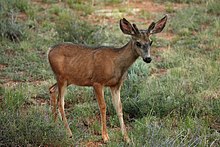Capreolinae
| Capreolinae Temporal range: Late Pliocene to present
| |
|---|---|

| |
| Mule deer (Odocoileus hemionus) | |
| Scientific classification | |
| Domain: | Eukaryota |
| Kingdom: | Animalia |
| Phylum: | Chordata |
| Class: | Mammalia |
| Order: | Artiodactyla |
| Family: | Cervidae |
| Subfamily: | Capreolinae Brookes, 1828 |
| Genera | |
| Synonyms | |
|
Odocoileinae | |
The Capreolinae, Odocoileinae, or the New World deer are a subfamily of deer. Alternatively, they are known as the telemetacarpal deer, due to their bone structure being different from the plesiometacarpal deer subfamily Cervinae. The telemetacarpal deer maintain their distal lateral metacarpals, while the plesiometacarpal deer maintain only their proximal lateral metacarpals.[1] The Capreolinae are believed to have originated in the Late Miocene, between 7.7 and 11.5 million years ago, in central Asia.[2]
Although this subfamily is called New World deer in English, it includes reindeer, moose, and roe deer, all of which live in Eurasia.
Classification
The list is based on the studies of Randi, Mucci, Claro-Hergueta, Bonnet and Douzery (2001); Pitraa, Fickela, Meijaard, Groves (2004); Ludt, Schroeder, Rottmann and Kuehn (2004); Hernandez-Fernandez and Vrba (2005); Groves (2006); Ruiz-Garcia, M., Randi, E., Martinez-Aguero, M. and Alvarez D. (2007); Duarte, J.M.B., Gonzalez, S. and Maldonado, J.E. (2008)
- Tribe Capreolini
- Genus Alces
- Moose or Eurasian elk (A. alces)
- Genus Capreolus
- Western roe deer (C. capreolus)
- Eastern roe deer (C. pygargus)
- Genus Alces
- Tribe Rangiferini (reindeer and New World deer)
- Genus Rangifer
- Caribou/reindeer (R. tarandus)
- Genus †Agalmaceros
- Genus Hippocamelus
- Taruca (H. antisensis)
- South Andean deer or huemul (H. bisulcus)
- Genus Mazama
- Gray brocket (M. gouazoubira)
- Northern Venezuelan brocket (M. cita, considered by some authorities to be a subspecies of M. gouazoubira)
- Ecuador brocket (M. murelia, considered by some authorities to be a subspecies of M. gouazoubira)
- Isla San Jose brocket (M. permira, considered by some authorities to be a subspecies of M. gouazoubira)
- Colombian brocket (M. sanctaemartae, considered by some authorities to be a subspecies of M. gouazoubira)
- Brazilian brocket (M. superciliaris, considered by some authorities to be a subspecies of M. gouazoubira)
- Peruvian brocket (M. tschudii, considered by some authorities to be a subspecies of M. gouazoubira)
- Rodon (M. rondoni, considered by some authorities to be a subspecies of M. gouazoubira)
- Amazonian brown brocket (M. nemorivaga)
- Central American red brocket (M. temama)
- Yucatan brown brocket (M. pandora)
- Small red brocket or bororo (M. bororo)
- Dwarf brocket (M. chunyi)
- Pygmy brocket (M. nana)
- Merida brocket (M. bricenii)
- Little red brocket (M. rufina)
- American red brocket (M. americana) (This species has found to be closer to Odocoileus than other brockets.)[3]
- Ecuador red brocket (Mazama gualea, considered by some authorities to be a subspecies of M. americana)
- Brazilian red brocket (M. jucunda, considered by some authorities to be a subspecies of M. americana)
- Trinidad red brocket (M. trinitatis, considered by some authorities to be a subspecies of M. americana)
- Southern red brocket (Mazama whitelyi, considered by some authorities to be a subspecies of M. americana)
- Peruvian red brocket (Mazama zamora, considered by some authorities to be a subspecies of M. americana)
- Colombian red brocket (Mazama zetta, considered by some authorities to be a subspecies of M. americana)
- Genus Blastocerus
- Marsh deer (B. dichotomus)
- Genus Ozotoceros
- Pampas deer (O. bezoarticus)
- Genus Pudu
- Northern pudu (P. mephistophiles)
- Southern pudu (P. pudu)
- Genus Odocoileus
- White-tailed deer (O. virginianus)
- Mule deer (O. hemionus)
- Genus Rangifer
References
- ^ Azanza, B.; Rossner, G.; Ortiz-Jaureguizar E. (2013). "The early Turolian (late Miocene) Cervidae (Artiodactyla, Mammalia) from the fossil site of Dron-Durkheim 1 (German) and implications on the origin of crown cervids". Paleobiodiversity and Paleoenvironments. 93 (1): 217–258. doi:10.1007/S12549-013-0118-1 (inactive 2018-10-05).
{{cite journal}}: Unknown parameter|last-author-amp=ignored (|name-list-style=suggested) (help)CS1 maint: DOI inactive as of October 2018 (link) - ^ Gilbert, C.; Ropiquet, A.; Hassanin A. (July 2006). "Mitochondrial and nuclear phylogenies of Cervidae (Mammalia, Ruminantia): Systematics, morphology, and biogeography". Molecular Phylogenetics and Evolution. 40 (1): 101–117. doi:10.1016/J.Ympev.2006.02.017. PMID 16584894.[permanent dead link]
- ^ Duarte, J. M. B.; González, S.; Maldonado, J. E. (2008). "The surprising evolutionary history of South American deer" (PDF). Molecular Phylogenetics and Evolution. 49 (1): 17–22. doi:10.1016/j.ympev.2008.07.009. PMID 18675919. Archived from the original (PDF) on 2012-02-09.
{{cite journal}}: Unknown parameter|deadurl=ignored (|url-status=suggested) (help); Unknown parameter|last-author-amp=ignored (|name-list-style=suggested) (help)
